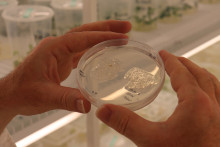After studying Medical Biology in Amsterdam, Van Orsouw started her career in the USA, in the field of cancer genetics and aging, and graduated in 1998 on the development of a novel technology to identify genetic mutations that can cause cancer or aging. When she moved back to the Netherlands in 2002, she applied for a job at KeyGene. ‘This may seem like a massive career switch, but the technologies I worked on in the USA are equally applicable to plant genomes,’ she explains. Van Orsouw started as project leader and is currently the Vice President Technology Development. She never regretted her transfer: ‘Plant Biology continues to be a challenging and interesting field.’
 Sequencing genomes to improve crops
Sequencing genomes to improve crops
KeyGene’s partners are predominantly plant breeders in business and at institutes. ‘Knowledge of relevant genes and their expression helps our clients to develop plants with certain desired characteristics like resilience to drought or diseases,’ says Van Orsouw, who leads several teams that work on and with DNA isolation and genome sequencing, as well as genome editing, regeneration and digital phenotyping.
‘The innovation process is different every time,’ she says. ‘For example, the process of isolating DNA differs for each type of plant. Furthermore, when we have identified a certain gene and are able to modify it in the desired way, we need to grow plants with the new characteristic, which is not always straightforward and requires a specific strategy for each type of crop.’
Always one step ahead
Work in the Technology Development department is therefore always innovative, and often rather complex. ‘Fortunately, we have very creative people in our teams, including recently graduated young talents,’ Van Orsouw says. ‘KeyGene also offers employees room and funding to explore new, out-of-the-box ideas and to rapidly develop new skills and competences. This is great fun, and has strategic value: our partners expect us to always be one step ahead.’
Collaboration often gives the company early access to the latest technologies in sequencing. KeyGene has strong bonds both with universities and with companies that produce equipment for e.g. DNA technologies. Van Orsouw: ‘We work together closely with Oxford Nanopore Technologies, for example. We often have early access to new prototypes or software. We test the equipment for them, and gain knowledge on how these innovations can be valuable for our strategic partners.’
Directly applicable
As Vice President, Van Orsouw is not only responsible for creating the optimal conditions for her staff to flourish. She is also part of the management team that develops long term strategies for KeyGene. ‘Again, collaboration is essential,’ she points out. ‘Innovations that are really capable to give breeding a boost, go beyond one’s own fields of expertise. For example, bioinformatics is essential to solve the complex issues the experts in my group are working on.’
Van Orsouw is proud of what KeyGene is able to achieve as a relatively small company, she says: ‘With ‘only’ 150 employees, we work on so many different projects, for and with a lot of different partners. This is only possible because we have such a valuable knowledge network, and our employees are able to collaborate quickly and efficiently. We are developing techniques that are directly applicable in the breeding process, which is very satisfying.’
Text: Bauke Vermaas Photo: KeyGene
4tu career special
This story previously appeared in the 4TU Career Special.




 Sequencing genomes to improve crops
Sequencing genomes to improve crops


